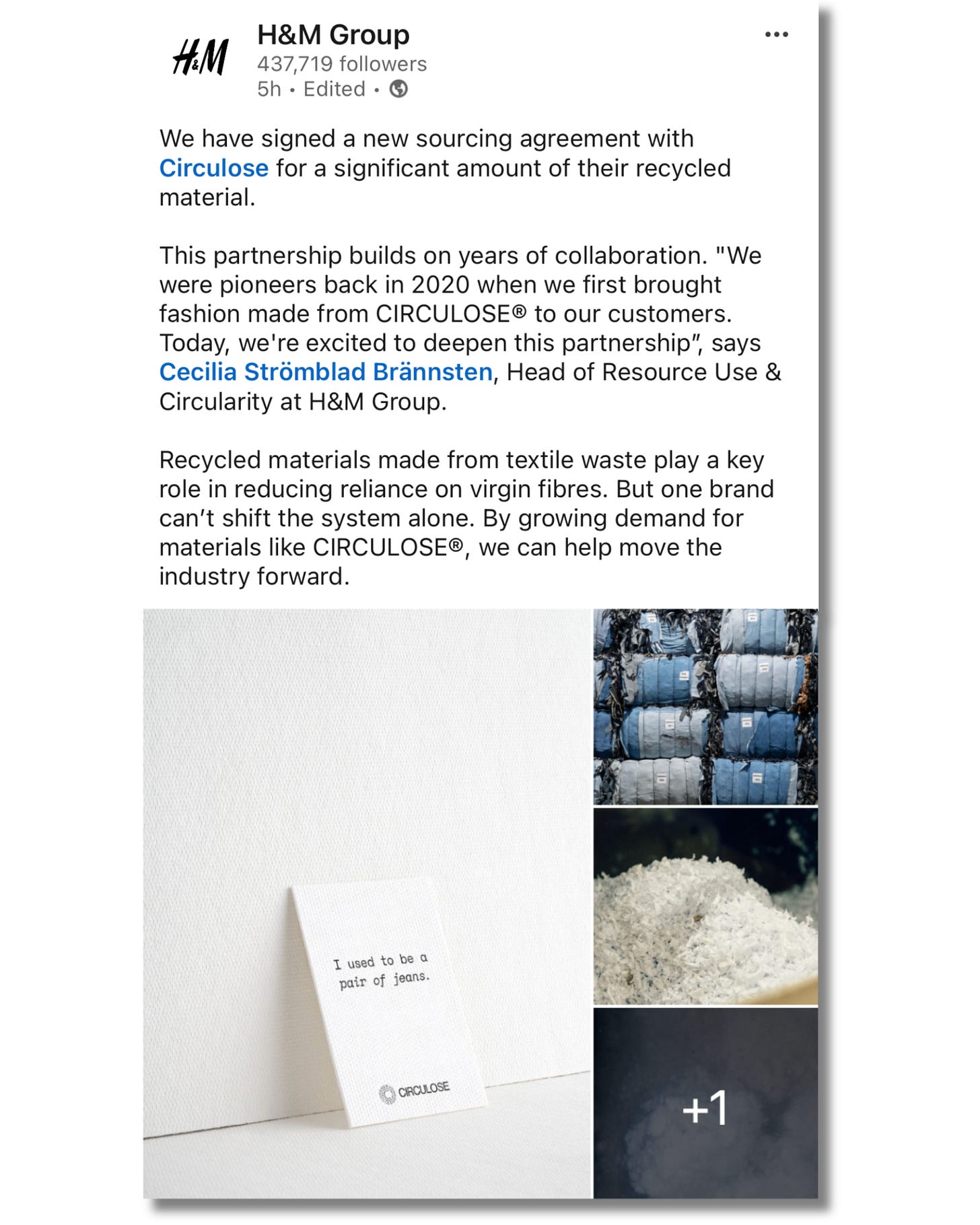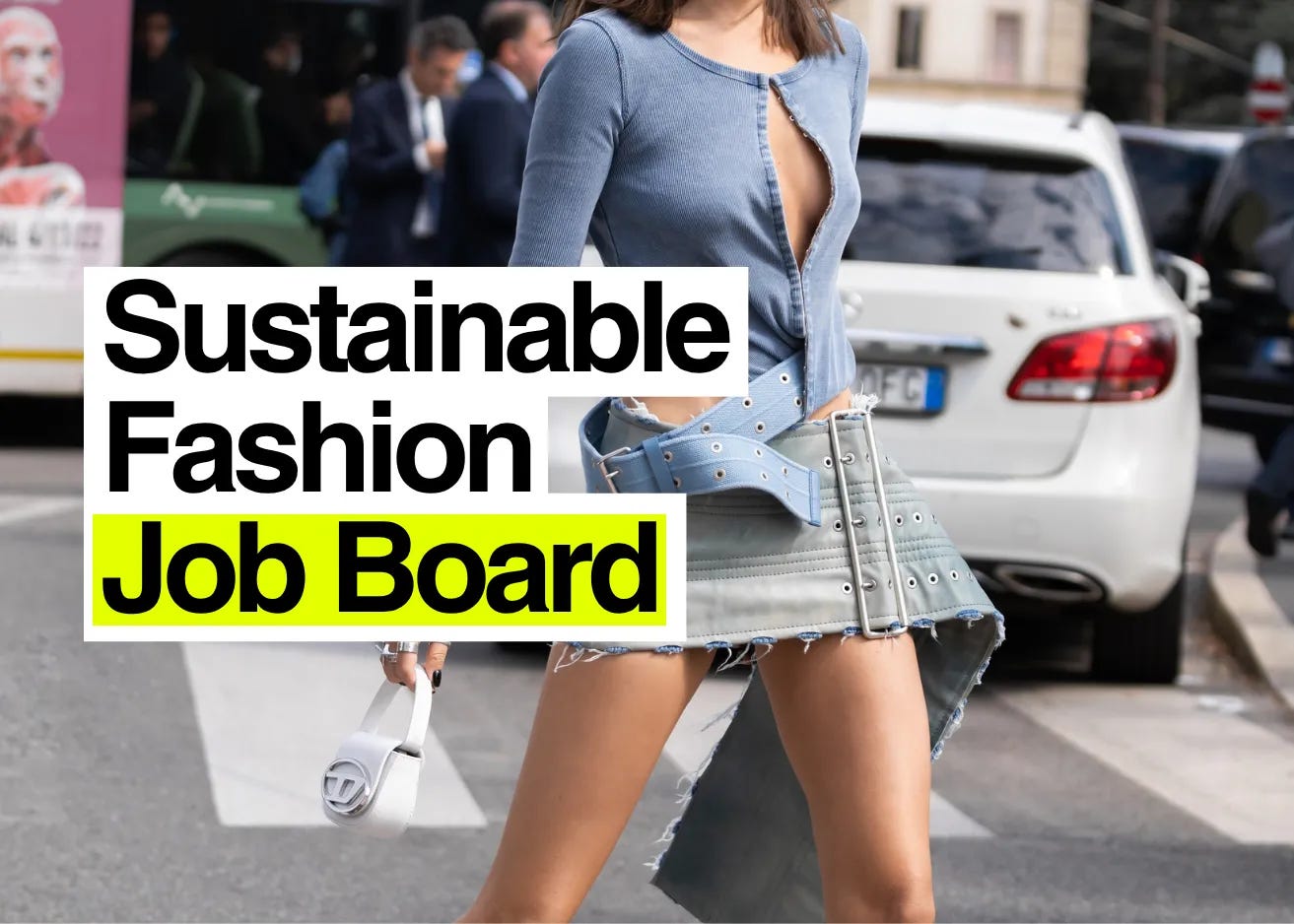H&M Signs New Deal with Circulose After Renewcell’s Collapse
They broke up. Now they’re reuniting—with a multi-year deal.
Welcome to Week/End, your quick-hit guide to the sustainable fashion news shaping the industry. Trusted by the people driving sustainability at the world’s biggest fashion brands, it’s what directors, climate leads, and circularity managers read for context, clarity, and culture—without the jargon, fluff, or information overload.
In today’s Week/End recap:
🤝 H&M Group signed a multi-year deal to scale Circulose across its brands, reviving the partnership after Renewcell’s collapse.
🏭 Manufacturers are done waiting for brands. Two global industry groups, IAF and ITMF, launched The Apparel and Textile Transformation Initiative, shifting decarbonization power from brands to suppliers. It kicks off in Bangladesh and Türkiye with country-led action plans.
♻️ Gap Inc., Target, and Houdini Sportswear were named Syre's first official Launch Partners. All three will integrate Syre’s recycled polyester into their supply chains as the startup ramps production in North Carolina and, later, Vietnam.
🐄 Coach’s leather supply chain is under scrutiny. An Earthsight investigation links its Italian tanneries to illegal cattle ranching in Brazil. All are certified by the Leather Working Group, raising questions about the limits of certification as proof of sustainability.
⚡ Bangladesh leads the world in LEED-certified factories, but 57% of its energy still comes from fossil fuels, according to a new Cascale report. It’s now a pilot country for ATTI’s supplier-led decarbonization push.
📲 A new Bain x eBay report says most brands treat Digital Product Passports as a compliance checkbox—but they could unlock repair, resale, and services that give 65% of the value back to consumers.
…and more!
💼 PLUS: Sustainability roles just dropped from Stella McCartney, Loewe, Saint Laurent, and more—now live on the SFF Job Board.
H&M Backs Circulose After Renewcell’s Collapse
What’s going on:
H&M Group signed a multi-year deal to scale its use of Circulose across its brands. It’s the second major partnership since the company relaunched under new leadership—after Renewcell, its former iteration, filed for bankruptcy last year.
Why H&M’s backing carries extra weight
H&M was one of Renewcell’s earliest and most high-profile supporters—an investor, a board-level partner, and one of the first brands to launch products made with Circulose. Over a seven-year period, the group committed around $29 million through loans and offtake agreements to help scale the tech. But when Renewcell filed for bankruptcy in early 2024, H&M opted not to increase its financial support, sparking industry-wide frustration and renewed scrutiny over whether brands were doing enough to help next-gen materials scale.
The pressure only intensified days later, when H&M announced a $600 million offtake deal with Syre, its co-founded polyester recycling venture.
Now, H&M Group is backing Circulose again, this time under new ownership, a new pricing model, and a more pragmatic go-to-market strategy.

Circulose is leveling up with tools to match the material:
Also this week, Circulose launched Circulose Forward, a new platform designed to help brands integrate circular cellulosic fiber into their supply chains. It includes a digital material library, vetted supplier network, and price calculator to make circularity easier (and more affordable) to adopt at scale. Developed with Canopy, the initiative pushes brands away from deforestation-linked virgin fibers and toward low-carbon alternatives.
Meanwhile, over at Syre…
On Tuesday, Syre announced Gap Inc., Houdini, and Target as its official Launch Partners for circular polyester. Each brand has committed to integrating Syre’s recycled polyester into its supply chain: Gap will source 10,000 metric tons annually, Houdini will replace half of its polyester use, and Target will use the material in select owned-brand products. The partnerships support Syre’s plans to scale production at its first U.S. facility, opening in North Carolina in 2026.
I asked Syre’s CEO, Dennis Nobelius, about how these partnerships came together, what makes them strategically important, and what it will actually take to scale circular polyester at the pace this moment demands.
“Gap and Target are massive players with sustainability ambitions and market power to drive a new standard. Houdini is smaller, but a leader in innovation and functionality. All three understand that they need to future-proof—locking in access to a resource that will be scarce. There aren’t many textile-to-textile recyclers operating at the scale we’re building toward.”
So what does that scale look like?
Syre’s blueprint facility in North Carolina, slated for 2026, will handle the first commercial volumes. But the real scale will come from a planned mega-plant in Vietnam, where construction is expected to begin in 2027. That’s where the company expects to produce 150,000–250,000 metric tons annually. A massive leap from the U.S. facility’s 10,000.
And while demand for recycled polyester is expected to hit 10–12 million tons in the coming years, Syre is starting with intention:
“We’re prioritizing brands with commercial commitment, supply chain collaboration, and speed. This isn’t first come, first serve. These are deep partnerships—we’ve been working with these companies for over a year, mapping needs, ambitions, and infrastructure. This level of trust takes time.”
That also means brand partners need to engage well beyond the fiber stage. Syre expects its partners to help activate the rest of the chain—from fiber spinners to garment factories—to ensure the material can integrate smoothly into real-world production systems.
So what defines success?
“Having big-name commitments is one part. But we also need feedstock infrastructure—systems for collecting, sorting, and funneling waste into the process. And we need countries like Vietnam to see this as part of their industrial future. It’s all connected.”
And if you're wondering how volume will be split, especially with Gap’s 10,000-ton commitment already matching Syre’s North Carolina output, that’s been accounted for.
“The NC plant is just the beginning. The larger volumes for partners like Target and Houdini will come from Vietnam—and that’s just our first large-scale facility of many.”
COLLABORATIONS & INITIATIVES
Two manufacturing groups launched the Apparel and Textile Transformation Initiative (ATTI), a new program to put suppliers—not brands—in charge of decarbonization strategy. Led by the International Apparel Federation (IAF) and the International Textile Manufacturers Federation (ITMF), ATTI responds to growing frustration over fragmented brand demands by giving manufacturers control over national sustainability roadmaps. It kicks off in Bangladesh and Türkiye with country-led action plans focused on emissions, water, chemicals, and waste.
United Repair Centre expanded its partnership with Decathlon to cover repair services for 92 stores across Germany.
ACCOUNTABILTY
Coach is facing scrutiny after a new Earthsight report linked its leather supply chain to illegal cattle ranching in Brazil. The investigation identifies ties between Coach’s Italian tannery suppliers and Frigol, a Brazilian meatpacker sourcing from ranches implicated in deforestation and land grabbing in the Apyterewa Indigenous Territory. All of the suppliers named in the report are certified by the Leather Working Group—raising questions not just about Coach’s supply chain oversight, but about the limits of industry certifications that brands use to signal sustainability. While Coach has leaned into a sustainability-forward rebrand to win over Gen Z, the report highlights a deeper problem—industry certifications like LWG are failing to guarantee deforestation-free leather, and brands are using them as a substitute for true traceability.
REPORTS & PAPERS
A new Bain x eBay report says most brands are treating Digital Product Passports (DPPs) as a compliance checkbox. But DPPs could double product lifetime value by unlocking resale, repair, and post-purchase services. Consumers stand to capture up to 65% of that value, while brands leading on circularity could boost both product and customer lifetime value.
Bangladesh leads the world in LEED-certified garment factories—but still relies heavily on fossil fuels. Cascale’s latest report highlights the paradox: 240 certified factories, 500 more in the pipeline, yet 57% of the country’s energy still comes from gas. Bangladesh is now a pilot for ATTI, the new manufacturer-led decarbonization initiative backed by IAF and ITMF.
FUNDING
The H&M Foundation launched phase two of Oporajita, a multi-stakeholder initiative focused on empowering women garment workers in the shift to net-zero. The €9 million investment will support climate resilience, heat stress mitigation, and policy advocacy, while building innovation ecosystems to enable a more equitable transition.
Novoloop raised a $21 million Series B led by Taranis to scale its Lifecycling tech, a chemical recycling process that turns post-consumer polyethylene into high-performance polyurethane.
What caught Week/End readers’ attention last week?
✅ NYC awarded $45M to launch Gotham Foundry, a sustainable materials innovation hub led by Columbia, FIT, and Genspace.
✅ WBCSD released Circular Transition Indicators v2.0 with new metrics for design, regenerative inputs, and social impact, aligned with ESRS E5.
✅ Fashion for Good and Altmat launched Altag Fiber Club to fast-track adoption of agri-waste-based next-gen materials.
✅ British Vogue launched Vogue Values, a year-long campaign with eBay and Nike focused on sustainability, equity, and access in fashion.
► Sojo is expanding into France, opening its first international concession inside Westfield’s Les 4 Temps in Paris. The repair service is tapping into the country’s push for circular fashion, with strong policies that support reuse and repair.
► Munroe Bergdorf wore a custom Patrick McDowell gown made with Circ’s recycled Lyocell to the Serpentine Summer Party. The dress was made from Circ® Lyocell—a silk-like filament fiber derived from 40% recycled textile waste. It’s the first time Circ and McDowell have teamed up, and it puts circular materials front and center on one of London’s biggest cultural stages.
► Estate sales are turning into a resale treasure trove. As tariffs loom and prices go up, Gen Z and millennials are turning to estate sales for quality pieces at lower price.
Want a career in sustainable fashion? Start here!
The SFF Job Board is your go-to hub for sustainability roles in fashion. From ESG, impact, and circularity to compliance, traceability, and transparency—we only post jobs that sit at the intersection of fashion and sustainability. Nothing else.
New this week:
LOEWE | Head of Compliance (Sustainability & Risk Management)
Madrid (Getafe), Spain | On-Site・Full-Time・Executive Level
↳ Apply hereStella McCartney | Product Compliance Coordinator
Novara, Piedmont, Italy | Full-Time
↳ Apply hereTJX Companies | Senior Manager / Director, Environmental Sustainability Reporting | Marlborough, MA | Hybrid・Full-Time・Senior Level
↳ Apply here
📌 Paid subscribers get full access to the full job board + updates every week.
🔗 Let’s stay in touch: LinkedIn | Instagram | TikTok
📣 Wanna reach 6.5K+ professionals in fashion and sustainability? Sponsor the newsletter!
📩 Love Week/End? Forward it to a friend—or sign up here to get it every Sunday!






















